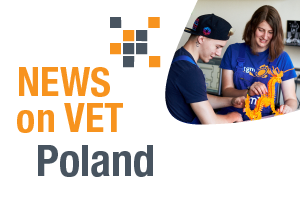The armed conflict in Ukraine has forced many citizens to leave their country; Poland became one of the main destinations for Ukrainians. From March 2022 to June 2022, over 2.7 million Ukrainian refugees arrived in Poland. Most of them were women and young people under the age of 18. Many of them have been hosted by Polish families, local governments, and NGOs. As learners and students made up a significant proportion of the refugees, support was needed to enable them to continue their education.
Regulatory framework and monitoring
In the Polish education system, issues related to the education of people from foreign countries are resolved in the Act of 14 December 2016 on Education Law and the regulation of the Minister of National Education of 23 August 2017 on the education of individuals who are not Polish citizens, as well as Polish citizens who have received education abroad. All 7-18 year-old non-Polish citizens have the right to education and care in public primary and secondary schools free of charge.
Additional support was adopted for the education of children and young people coming from Ukraine to Poland through the Act of 12 March 2022 on assistance to Ukrainian citizens with an armed conflict in the territory of that State and the Regulation of the Minister of Education and Science of 21 March 2022 on the organisation of education, upbringing and care for children and youth who are citizens of Ukraine.
After 24 February 2022, learners from Ukraine enrolled in Polish education institutions are monitored though the Education Information System (SIO). Depending on their level of knowledge of the Polish language, Ukrainian learners can enter preparatory or regular classes. Preparatory classes have been also organised in VET schools. Until June 2022, 182 245 learners from Ukraine had been enrolled in Polish pre-schools and schools, including 3 868 learners in VET (vocational upper secondary programmes, first-stage sectoral programmes, post-secondary programmes, special job training programmes).
In order to monitor the situation and respond to the challenges likely arising in schools, the Minister of Education and Science established the Council for Refugee Education.
Problems and challenges
Refugee learners and students are usually facing a language barrier, cultural differences, financial difficulties, and psychological problems. The comparison and recognition of the qualifications of learners obtained in Ukraine poses a further challenge for the education system.
Types of support
Support at school level
The following main support is available for Ukrainian refugees at school level:
- dedicated websites, resources (also in Ukrainian) and training for teachers who work with Ukrainian refugees, created by State institutions and NGOs;
- transport to schools free of charge;
- additional Polish language lessons in schools;
- preparatory classes with the teaching methods and curriculum adapted to the needs of learners from abroad;
- scholarships and allowances;
- exemption from the fee for the confirmation of the education of Ukrainian refugees for regional education authorities;
- the matura and vocational exams in the current school year with the possibility of additional adaptations, such as examination sheets in Ukrainian, examination time, possibility of using dictionaries during the exam;
- exemption from compulsory education for learners who continue distance education in schools in Ukraine;
- reduced requirements for teacher assistants providing support to refugee learners during classes: Polish citizenship and language certificates are not required – only sufficient knowledge of Polish language at a level that enables learners to benefit from learning;
- no qualification requirements for employment of Ukrainian citizens in schools. Appropriate preparation, assessed by the school director, is sufficient, even if a candidate’s diploma is not formally recognised;
- facilitated employment of Ukrainian professionals in public psychological-pedagogical counselling centres to improve the recognition of the special education needs of Ukrainian refugee learners, and providing them with suitable psychological-pedagogical assistance. Such employment is subject to the approval of the regional education authorities.
Support at higher education level
In June 2022, there were 833 students with Ukrainian citizenship in Poland. The main support for Ukrainian students is organised under the programme Solidarity with Ukraine. Ukrainian students were offered an opportunity from March to September 2022 to continue their studies in Poland, to do work related to the preparation of doctoral theses or participate in other forms of education. This initiative is implemented by the National Agency for Academic Exchange on behalf of the Ministry of Education and Science and the Ministry of Health. The programme provides the following support:
- admission of programme participants to HE programmes with exemption from all fees in the summer term;
- enabling work related to the preparation of a PhD dissertation to be undertaken;
- ensuring participation in other forms of education free of charge, to a maximum of 15 hours per week (language or preparatory courses);
- scholarships for all participants of the programme available for the entire period in which the student participates in the activities above, and remains in Poland;
- psychological and legal assistance related to education.
The Ministry of Education and Science is planning to extend the support provided under the education law to the 2022/23 school year to help integrate Ukrainian refugees more quickly in the Polish education system.
Since the beginning of the armed conflict in Ukraine, NGOs have also been actively involved in supporting refugees, mainly through various types of financial and material assistance as well as providing accommodation.
Read more
- Admission to Polish schools of children and youth from Ukraine – Letter of the Minister of Education and Science to superintendents, local government officials and school directors (Polish language)
- Rules for the organisation of preparatory classes in primary and secondary schools (Polish language)
- Recommendation on the integration of refugee children from Ukraine (Polish language)
- Information about the support for students from Ukraine (Ukrainian language)
- Solidarity with Ukraine – Programme for students and researchers from Ukraine (Polish language)
|
Please cite this news item as: ReferNet Poland; Cedefop (2022). Poland: the country’s response to the crisis in Ukraine. National news on VET |
